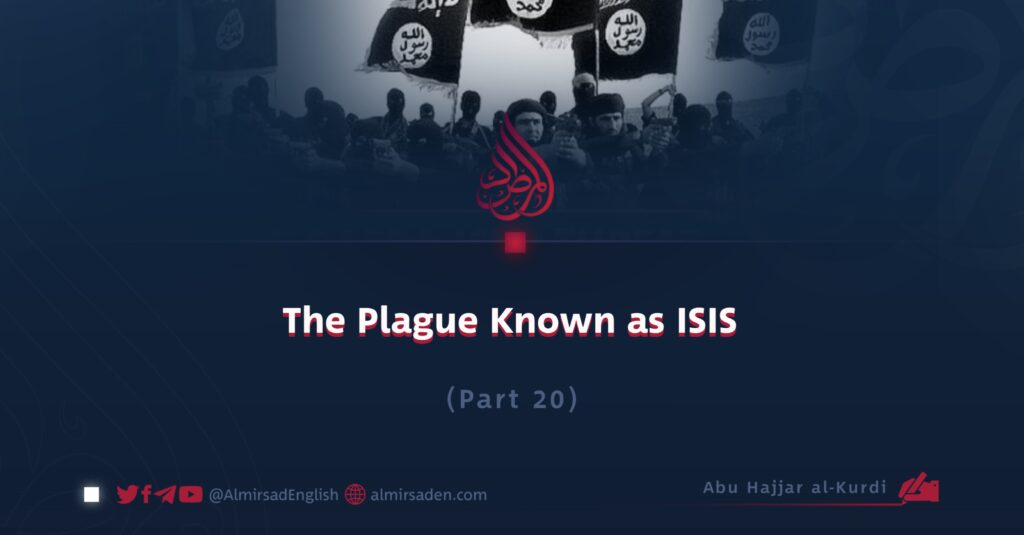Part 20
Author: Abu Hajjar al-Kurdi
The crimes perpetrated by Daeshi Khawarij are boundless in their scope and brutality. Across the globe, the scars of their oppression are starkly evident, and the shadow of their tyranny continues to darken the fate of countless innocent lives.
After carrying out the mass slaughter of hundreds of thousands of civilians in Syria, the group extended its sinister reach into Iraq, continuing its reign of terror throughout Mesopotamia—the historic land of the Two Rivers.
Prior to 2014, the militants of Abu Bakr al-Baghdadi’s group—operating under the name “Islamic State of Iraq”—had been relatively contained following prolonged clashes with American and Iraqi forces, especially in the province of Anbar. However, the outbreak of the Syrian civil war in 2011 presented the group with a fresh opportunity to reorganize and expand. This resurgence was not driven by popular support or ideological appeal, but rather through sheer brutality, intimidation, and coercion. Civilians were compelled to join or submit under the shadow of the gun.
The Fall of Mosul: A Turning Point of Bloodshed and Treachery
On June 10, 2014, Daesh launched a rapid and coordinated assault on Mosul, Iraq’s second-largest city with a population exceeding two million and the capital of Nineveh province. Despite their relatively small numbers—estimated between 800 and 1,000 fighters—Daesh managed to capture the city in a stunning display of speed and shock.
Collapse of the Iraqi Forces
The attack began on the city’s outskirts and quickly penetrated its urban center. Despite being equipped with modern weaponry, the Iraqi army lacked the morale and cohesion to resist. Entire units abandoned their posts, leaving behind a vast stockpile of military hardware—tanks, armored vehicles, and ammunition—which fell directly into the hands of Daesh.
Strategic and Symbolic Significance of Mosul’s Fall
Militarily, the seizure of Mosul provided ISIS with access to heavy weaponry and vast financial resources. Among the most significant gains was the looting of the Central Bank of Mosul, which reportedly yielded hundreds of millions of dollars. These assets enabled ISIS to further expand its operations across both Iraq and Syria.
Politically, the collapse of Mosul exposed the deep vulnerabilities and ineffectiveness of Iraq’s central government, then under the leadership of Prime Minister Nouri al-Maliki. This failure prompted intense domestic and international criticism and increased pressure for political reform.
Propaganda-wise, the fall of Mosul became a pivotal moment. On June 29, 2014—just weeks after the city’s capture—ISIS declared the establishment of a so-called Islamic Caliphate from the historic Great Mosque of al-Nuri. It was there that Abu Bakr al-Baghdadi made his first public appearance, arrogantly positioning himself as the self-styled caliph.
Humanitarian and Security Impact, however, was perhaps the most tragic. The fall of Mosul triggered a wave of atrocities. Religious and ethnic minorities—including Yazidis, Christians, and Shia Muslims—faced extermination, forced conversions, abductions, and mass displacement. Thousands fled their homes in terror, and entire communities were decimated.
Rapid Expansion Across Iraq
Following its success in Mosul, ISIS quickly extended its control over additional Iraqi provinces, including Salahuddin, Diyala, Anbar, and much of Nineveh. Major cities such as Tikrit, Fallujah, and Ramadi fell in quick succession. At the zenith of its power, ISIS controlled nearly one-third of Iraq’s territory.
The Battle to Liberate Mosul
In July 2017, after a ferocious nine-month military campaign marked by intense urban warfare and staggering civilian casualties, the Iraqi army—supported by the U.S.-led international coalition—succeeded in liberating Mosul from ISIS control. The battle, though victorious in the end, left the city in ruins and inflicted untold suffering upon its population.
Note:
The untold dimensions and concealed truths surrounding the Battle of Mosul will, Allah willing, be addressed in the subsequent part of this series.
